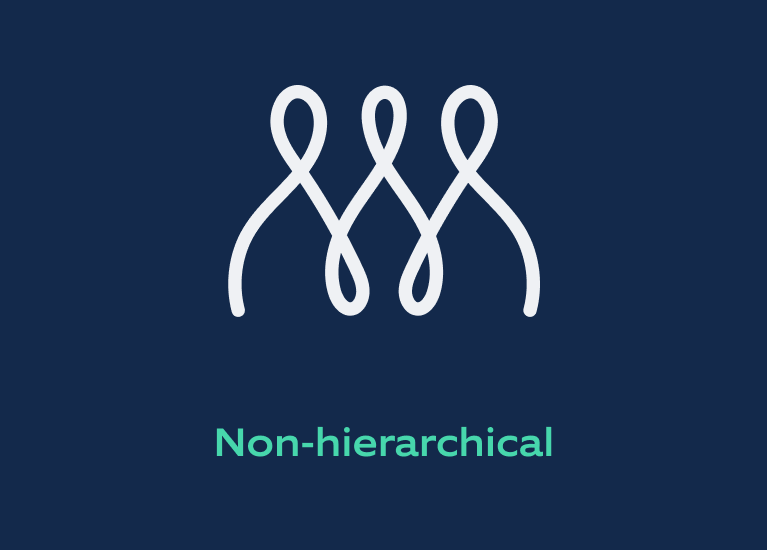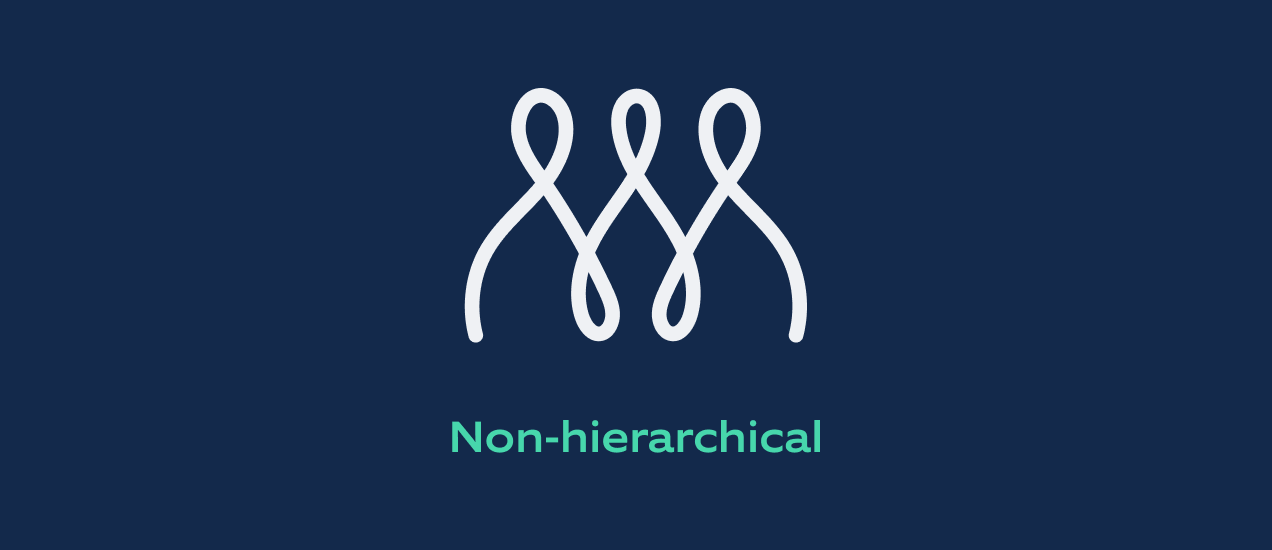CARING - being empathetic, respectful and non-judgmental - is a core value here at Nagarro. At the same time, it’s an acronym for six other core values - Client-centric, Agile, Responsible, Intelligent, Non-hierarchical, and Global - that are part of our org DNA and reflect our unique culture. After interviewing Nagarrians from around the world to understand their perspectives about these values, I created a series of blog posts, with each post focusing on one of our core values. Here’s the fifth blog from the CARING series, ‘N for Non-hierarchical’.
For this post, I ended up doing a Microsoft Teams chat with Ajit Appachu, Director of Business Development in Dubai. As someone who loves working without any boundaries, it is no wonder that he readily volunteered to talk about our core value of "N for Non-hierarchical”.
“Adopting a non-hierarchical organization mode is the only way a company can work”, said Ajit immediately. He has experienced working in hierarchical as well as flat organizations, and is proud that Nagarro follows a non-hierarchical structure, both in letter and in spirit.
Ajit has been with Nagarro for almost a year and regards his fellow Nagarrians as ‘friends rather than mere colleagues’. This comment made me smile, especially when thinking of what he shared about his past experiences, both private and professional. Read on to know why Ajit is so passionate about his favorite Nagarro value.
[Sabrina Floh] What is the first thing that comes to your mind when you hear the term “non-hierarchical”?
[Ajit Appachu] In one word, I would say, entrepreneurial.
Absolutely! And what exactly do you mean with that?
The non-hierarchical approach allows you to be who you are, helping you express your own views and opinions throughout the company. Ultimately, this enables you to create value for the customers.
Did you also have some private touch points with this value?
Yes, because I come from a background which some might consider a feudal society, one with a hierarchy of landlords and workers. I noticed this way of life while growing up. Besides, my father had a military background, which is all about hierarchy. I experienced the challenges and difficulties of existing in a hierarchical structure quite early in life, and just couldn’t understand that world. I could never allow myself to subscribe to a lifestyle where nosy people watch over you, judge what you’re doing and how you’re doing it, and don’t allow you to do things in your own way. This idea goes against my values and somehow undermines innovation and creativity.
And how did you start your professional life with these experiences?
I think that I was fortunate. At my first job, which dates back to almost 20 years, they used a non-hierarchical structure. Because of my personality, I was fortunately allowed some personal freedom and therefore, was able to fit into their ecosystem very well. Later, I moved to another company that was a very hierarchical and structured organization. Because of this, decision-making was always a challenge. This was especially true when trying to solve problems for customers who expect a quick turnaround and faster solutions. I realized that this type of org structure mainly resulted in more bureaucracy and office politics. Such an organizational culture restricted my performance. That was 17 years ago, but even then, I realized that this was not the kind of organization I wanted to be with.
After all you have experienced, what do you think are the advantages and disadvantages of the flat hierarchy model?
In a non-hierarchical model, you must be able to function autonomously. You have to be proactive in making decisions and solving customers’ problems without feeling the need to climb the bureaucratic ladder to get approvals at each step. You are, therefore, more responsible and committed to your work. These advantages also benefit the customer because the autonomy you’re given can boost your creativity when it comes to designing personalized solutions.
At the same time, this might be a problem for people who prefer working within structured hierarchy. If a staff member is accustomed to receiving clear instructions from the chain-of-command, they may feel insecure about making their own decisions. In that case, perhaps team building exercises can encourage others to see the advantages of a flat hierarchy.
And how do you think you or other Nagarrians work in a non-hierarchical way at Nagarro?
I think people enjoy the freedom of choice at Nagarro. For new employees coming in from a company that had a traditional hierarchical structure, it may take some time for them to adjust to our culture. We, and that includes everyone else at Nagarro, are responsible for including those people, and supporting them as they adapt to this new way of working. To put it simply, Nagarro cares about its people. We help and empower each other, and we recognize value in one another – this is part of our DNA. It doesn’t feel like working with colleagues; it’s more like working with friends.
Would you also say that our customers appreciate such a working model?
Absolutely. Just this weekend, there was a situation where a client required immediate assistance and he reached out to several people at Nagarro. The customer received multiple responses within minutes, and we were able to solve his problem. We didn’t need a manager to tell us what to do. Our team recognized the client’s pain and worked together to support them. As a result, the client greatly appreciated our efforts.
In comparison to Nagarro, what relevance do other companies assign to this value?
I’m sure there are many other companies who have adopted this model. However, I have previously worked for companies who claimed to have a non-hierarchical policy where, in reality, their claim was only a marketing ploy. This resulted in unfortunate situations, because customer and employee relations suffered due to the stressful atmosphere and suppression of ideas that comes with having too much middle management.
So, what advice do you have for our readers?
Looking to the future, I believe that being non-hierarchical is the only way for a company to move forward and keep progressing. Nagarro is a knowledge-based organization. We solve complex problems and create value for customers. We need to recognize and take advantage of the freedom that such a flat working model creates for us. Working in a stress-free environment fosters innovation and creativity. And ultimately, this is what our business is all about, right?
Absolutely! What an insightful discussion that was, thanks to Ajit.
This summarizes another talk around our CARING values. Check out this cool video where other Nagarrians reflect on this core value:
You can view the previous blogs from our CARING series here: C for Client-centric, A for Agile, R for responsible, and I for Intelligent. The next blog in the CARING series will be on ‘G for Global’. Stay tuned and till then, do check out our blog space!





-4.png?width=83&height=83&name=MicrosoftTeams-image%20(39)-4.png)
